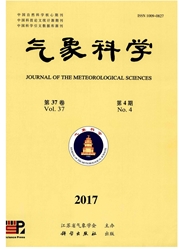

 中文摘要:
中文摘要:
用安徽省17个城市逐日的最高气温、最低气温数据,采用百分位法计算了1988-2010年安徽省年际极端气温事件,并以计量经济学的结构向量自回归模型为基础,将极端气温事件作为一个因子与农业总产值、国内生产总值、农业机械总动力构建了新的经济-极端气温事件模型.进一步通过脉冲响应函数和方差分解方法,定量分析了极端气温事件对安徽省农业生产的动态影响,结果表明:极端高温事件对农业生产的影响总体为负向,并表现出一定的滞后性;而极端低温事件对农业生产的影响初期为正向,后期逐渐转为负向.极端高温事件对农业生产的影响程度较高,可达0.033%,极端低温事件次之.模型内引起农业生产变化的各因子中,极端高温事件的贡献比例可达25.3%,是重要的影响因子;极端低温事件的贡献比例最高为10.9%,也是比较主要的影响因子.
 英文摘要:
英文摘要:
By using the daily maximum and minimum temperature data of 17 cities in Anhui,the interannual extreme temperature events' number in Anhui during 1988-2010 was calculated with the centesimal value method.Based on the structural vector autoregression model in econometrics,a new economy-extreme temperature event model was built by combining extreme temperature event,taken as a factor,with agricultural output,gross domestic product and agricultural machinery gross power.Furthermore,the dynamic effect of extreme temperature events on agricultural production was quantitatively analyzed by impulse response functions and variance decomposition.The results show that the overall effect of extreme high temperature events on agricultural production is negative with a certain lagging characteristics; the early effect of extreme low temperature events is positive,then turns to negative.The effect of extreme high temperature events on agricultural production is 0.033%,higher than the extreme low ones.The extreme high temperature event is the most important one among the factors involving agricultural production change in the model,its contributions ratio is 25.3%,while the extreme low temperature came second with 10.9%,which was still a relatively major factor.
 同期刊论文项目
同期刊论文项目
 同项目期刊论文
同项目期刊论文
 期刊信息
期刊信息
